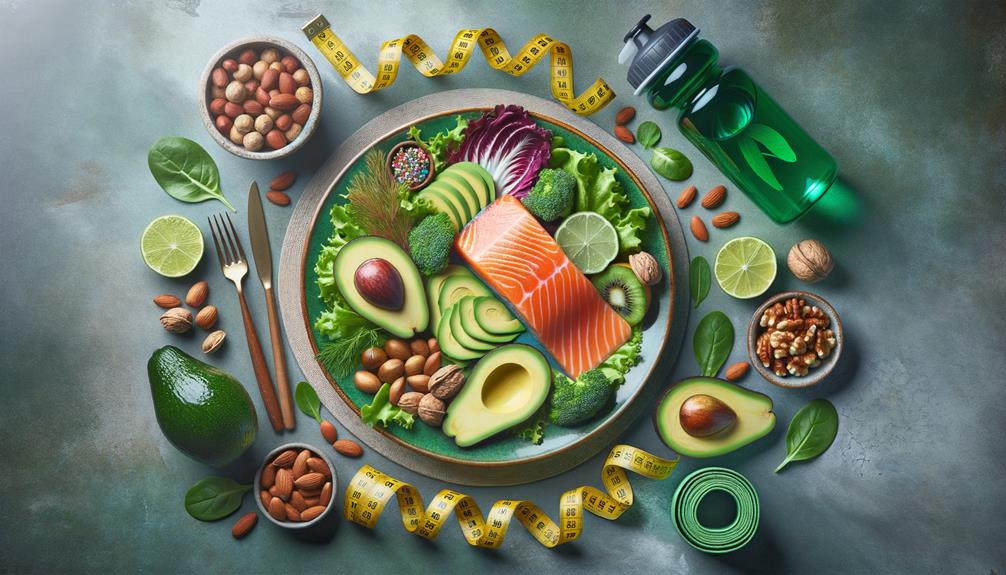Mastering the ketogenic diet essentials is crucial for your success. Focus on insulin control, meal timing, and intermittent fasting to optimize fat burning. Aim for 3-8 oz of protein per meal, choosing fatty sources over lean ones. Pair proteins with veggies before adding fats for better results. Opt for healthy fats like avocado and olive oil. Plan your meals strategically with a balance of protein and non-starchy vegetables. Consider consulting keto professionals for personalized guidance and meal plans. Learning the key principles is just the start to achieving your ideal keto lifestyle.
Key Takeaways
- Control insulin for fat utilization over sugar.
- Time meals to regulate insulin levels for fat burning.
- Incorporate intermittent fasting for ketosis and insulin regulation.
- Choose healthy fats like avocado and olive oil for nutrient absorption.
- Plan meals with proper protein, fats, and vegetables for keto success.
Key Principles for Keto Success
To succeed in mastering the ketogenic diet essentials, prioritize understanding the key principles that drive keto success. Insulin control plays an essential role in determining whether your body burns fat or sugar for energy. By focusing on meal timing, such as eating larger, less frequent meals, you can better regulate insulin levels and promote fat burning. Additionally, incorporating intermittent fasting can further aid in insulin regulation and shifting into ketosis. Remember, only eat when experiencing true hunger and consider skipping breakfast to optimize the benefits of intermittent fasting. By paying attention to insulin control and meal timing, you can effectively navigate the ketogenic diet and enhance your chances of success.
Protein and Fat Guidelines
Insulin control and proper meal composition are crucial in maximizing protein and fat intake for ketogenic diet success. To achieve ideal macros, aim for 3-8 oz of protein per meal, choosing sources like meat, fish, eggs, cheese, and nuts while avoiding added sugars. Opt for fattier protein sources over lean options and pair them with vegetables before adding fats to manage insulin levels effectively. Incorporate healthy fats such as avocado and olive oil into your meals, enhancing nutrient absorption by combining them with veggies. Opt for fat sources like olives, nuts, and coconut oil, steering clear of processed fats like soy, corn, and canola oils for better health outcomes.
Importance of Intermittent Fasting
Intermittent fasting plays a crucial role in optimizing the benefits of the ketogenic diet by regulating meal timing and insulin levels for enhanced metabolic outcomes. By incorporating intermittent fasting, you can greatly improve metabolism and experience cognitive benefits. This eating pattern involves cycling between periods of eating and fasting, allowing your body to burn stored fat for energy. Improved metabolism is a key advantage, as fasting periods enhance fat burning and promote weight loss. Additionally, intermittent fasting has been linked to cognitive benefits, such as improved focus and mental clarity. By strategically timing your meals and incorporating fasting periods, you can maximize the effects of the ketogenic diet on your metabolism and overall cognitive function.
Choosing Healthy Fats Over Harmful Oils
When optimizing your ketogenic diet, it's imperative to prioritize healthy fats over harmful oils to enhance nutrient absorption and overall well-being. Here are some essential tips to help you make the right choices when it comes to fats and oils:
- Choose Healthy Fats: Opt for sources like avocados, olive oil, nuts, and coconut oil for their nutrient-rich profiles.
- Avoid Harmful Oils: Steer clear of inflammatory fats found in oils like soy, corn, and canola to support your health goals.
- Cooking with Care: Use healthy fats for cooking and meal preparation to boost flavor and nutrient absorption.
- Keto-Friendly Snacking: Opt for snacks rich in healthy fats to keep you satisfied between meals and maintain your ketogenic state.
Meal Planning Strategies
To optimize your ketogenic diet journey, effective meal planning strategies play a crucial role in making sure your meals are well-balanced and aligned with your health goals. Meal prep is a key component to staying on track with your keto lifestyle. By planning your meals in advance, you can guarantee that you have the right ingredients on hand to create healthy, low-carb dishes. Consider incorporating recipe ideas that focus on protein-rich foods like meat, fish, eggs, and cheese paired with plenty of non-starchy vegetables. This combination will help you feel full and satisfied while keeping your carb intake in check. Experiment with different recipes to keep your meals interesting and enjoyable while sticking to your keto plan.
Consulting Keto Professionals
For personalized guidance and troubleshooting on your ketogenic diet journey, consider seeking advice from experienced keto professionals. These experts can provide you with expert advice and nutritional guidance tailored to your specific needs, ensuring you stay on track and achieve your health goals. When consulting keto professionals, you can benefit from:
- Personalized Meal Plans: Receive customized meal plans that align with your dietary preferences and requirements.
- Supplement Recommendations: Get advice on essential supplements that may support your ketogenic lifestyle.
- Monitoring Progress: Have your progress monitored closely to make necessary adjustments for best results.
- Addressing Challenges: Receive guidance on overcoming any challenges or plateaus you may encounter on your keto journey.
Frequently Asked Questions
Can I Consume Dairy Products on a Ketogenic Diet?
On a ketogenic diet, you can consume dairy products if you're not lactose intolerant. If you have issues with dairy, consider dairy alternatives like almond or coconut milk. Opt for full-fat dairy to support ketosis. Monitoring your body's response to dairy can help determine its suitability in your diet. Remember to prioritize nutrient-dense foods and listen to your body's needs when incorporating dairy products into your ketogenic meal plan.
Is It Necessary to Track Macros and Calories on Keto?
You don't have to track every calorie or macro on keto, but focusing on nutrient-dense foods is key. Prioritize meal timing and fasting techniques for insulin control and ketosis support. Embrace micronutrient-rich options like leafy greens and nuts for peak health. Incorporate these strategies wisely without getting lost in the numbers, making your keto journey successful and fulfilling.
How Can I Handle Social Gatherings While on Keto?
When maneuvering social gatherings on keto, opt for keto-friendly drinks like water with lemon or lime, unsweetened tea, or sparkling water. Politely decline non-keto options and handle peer pressure by confidently sticking to your dietary choices. Prioritize enjoying the company and conversations rather than focusing solely on food. Remember your goals and stay committed to your health. You can successfully maneuver social events while staying true to your keto lifestyle.
Are Artificial Sweeteners Allowed on a Ketogenic Diet?
On a ketogenic diet, artificial sweeteners can be used as sugar substitutes. While some sweetener alternatives are allowed, moderation is key. Opt for options like stevia, erythritol, or monk fruit to satisfy your sweet cravings without spiking blood sugar levels. Remember, too much of anything, even artificial sweeteners, can hinder your keto success. Balance is key when incorporating these sugar substitutes into your low-carb, high-fat diet.
What Are the Best Options for Keto-Friendly Snacks?
When looking for keto-friendly snacks, choose options like sugar-free dark chocolate, nuts, seeds, cheese, or hard-boiled eggs. These choices are portable and satisfying. For keto-friendly desserts, consider making avocado chocolate mousse, coconut fat bombs, or chia seed pudding with coconut milk. These treats are low in carbs and sugar, fitting well within a ketogenic diet. Remember to prioritize whole, nutrient-dense foods for best health benefits while on keto.
Conclusion
In mastering the ketogenic diet essentials, remember to focus on protein and fat guidelines, incorporate intermittent fasting, choose healthy fats over harmful oils, and plan your meals strategically. By consulting with keto professionals and staying committed to your goals, you can achieve keto success. Embrace the power of informed choices, prioritize your health, and take control of your well-being on your journey to mastering the essentials of the ketogenic diet.







